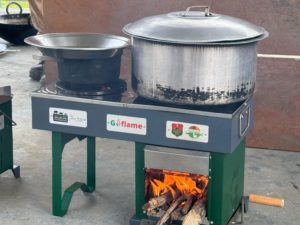By our reporter
 On International Day of Forests, Wildlife Trust of India (WTI) distributed improved cook stoves in Anti-Poaching camps in Kaziranga in a bid to raise standards of cooking, safety and long-term health concerns.
On International Day of Forests, Wildlife Trust of India (WTI) distributed improved cook stoves in Anti-Poaching camps in Kaziranga in a bid to raise standards of cooking, safety and long-term health concerns.
The Kaziranga National Park and Tiger Reserve in Assam, home to over 80% of the country’s population of the Greater one-horned rhinoceros, is a global stronghold for rhino conservation. The ‘Kaziranga model of conservation’ with a focus on setting up Anti-poaching camps has played a crucial role in significantly reducing the poaching incidents in the past few years.
As of today, Kaziranga has 233 anti-poaching camps (a camp for every 5.82 sq km), which are among the highest concentrations as compared to those in South Asia and Africa. Each APC is manned by 4-8 personnel whose primary duty is to carry out foot patrol and keep poachers and intruders at bay. While poaching numbers have declined, continuation of these arrangements is vital along with ensuring high morale and efficiency among field staff. The majority of these camps are in remote locations and difficult to access, especially during the monsoon season when a significant number are affected by floods.
Due to remoteness and inaccessibility, the APCs largely rely on fuel wood-based traditional self-made cook stoves. This has several drawbacks including time-consuming firewood collection, space required for storage, inefficient burning of fuelwood and health hazards caused by wood smoke.
While the Forest Department is working to improve the supply of LPG cylinders, firewood will remain an important source of fuel for many camps due to the remoteness of location and access. In this scenario, introducing industry-manufactured, efficient wood stoves presents a practical solution. The improved cook stoves are expected to reduce firewood consumption by up to 50%, lower emissions and smoke by up to 80%, reduce cooking time and decrease firewood storage needs.
The Kaziranga Park Authority with support from Wildlife Trust of India’s Rapid Action Project, provided 47 improved cook stoves across 45 anti-poaching camps and two community kitchens. The improved cook stoves are a mix of two pot stoves for 37 APCs, a single pot stove for 8 APCs and two 50-litre capacity stoves, that can cook for up to 100 people, for the kitchens at the Assam forest battalion and the Elephant camp.
The handover ceremony at each range between the 16th to 21st of March 2025 was accompanied by a training and demo-cooking session, engaging APC teams from each of the 9 ranges. A post-usage survey will be carried out one month after installation which will lay the case for a larger-scale intervention in the next phase.
Wildlife Trust of India (WTI) is a conservation organisation established in 1998 with a mission to conserve nature, especially endangered species and threatened habitats, in partnership with communities and governments. In its 25 years of operations, WTI has saved over 50,000 animal lives, trained and equipped over 20,000 frontline forest staff, assisted the government in creating 7 Protected Areas, sensitised 31 lakh children to conservation and assisted enforcement agencies in combatting wildlife crimes.



